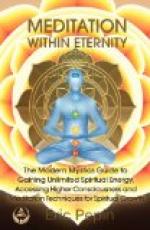This does not, however, mean that perfect bliss is nothingness. Rather is it everything-ness, in that it is all-embracing in its realization. In complete realization of the Cosmos nothing is excluded. Exclusiveness is a concomitant of the state of consciousness pertinent to the personal self, which state is not excluded from the consciousness described as cosmic, nirvana or mukti, but on the contrary, is included in it, even as the simple vibrations of the musical scale are included in the great harmonies of Wagner’s compositions.
“He who has realized Brahman becomes silent,” says Ramakrishna. “Discussions and argumentations exist so long as the realization of The Absolute does not come. If you melt butter in a pan over a fire, how long does it make a noise? So long as there is water in it. When the water is evaporated it ceases to make further noise. The soul of the seeker after Brahman may be compared to fresh butter. Discussions and argumentations of a seeker are like the noise caused during the process of purification by the fire of knowledge. As the water of egotism and worldliness is evaporated and the soul becomes purer, all noise of debates and discussions ceases and absolute silence reigns in the state of samadhi.”
A better translation of the word “noise” would be “sputtering.”
Sound is not necessarily noise. The idea conveyed is not intended to be a condition in which the soul becomes anaesthetized as it were, but a state of knowing, and the effort and the sputtering of questioning and searching is passed.
The same gospel better expresses the meaning thus:
“The bee buzzes so long as it is outside the lotus, and does not settle down in its heart to drink of the honey. As soon as it tastes of the honey all buzzing is at an end. Similarly all noise of discussion ceases when the soul of the neophyte begins to drink the nectar of Divine Love, at the lotus feet of the Blissful One.”
Who will not say that the bee is more satisfied when he has found and drank of the honey than when he is buzzingly seeking it?
Surely it is not necessary to be of one mind, in order that we may be of one heart. Even though we were as “like as two peas in a pod,” it is well to note that the two peas are two spheres—nature has made them separate and distinct despite their close resemblance.
To unite with the absolute should correspond to this unity of all hearts in the desire for a common effort to establish harmony, while we permit to each individual the freedom of mind; of taste; of choice of pursuits; of choice of pleasure; of discrimination; and preservation of identity.
Our contention is that mukti, or liberation (which we believe to be identical with attainment of cosmic consciousness) does not mean an absorption into the Universal, the Absolute, Brahm, to the extent of annihilation of identity. And we claim that this view finds corroboration in the best interpretation of Oriental philosophies and religions, as well as in the Christian doctrine.




